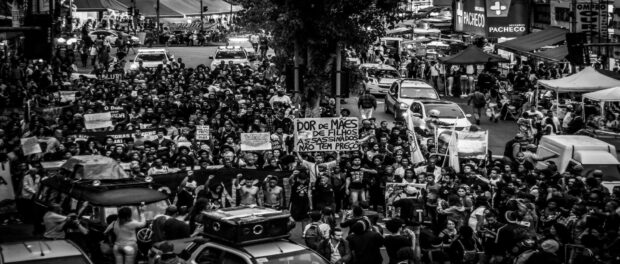
On Thursday December 3 approximately 1,000 people came together to protest the genocide against black youth at the hands of police. The protest took place in the North Zone neighborhood of Madureira in response to the killing of 5 young black men in Costa Barros on November 28.
“The genocide needs to stop, because if not, the city will stop.”
Protesters began arriving at 5pm wearing all black “to show that they’re grieving and that the white of peace never contemplated the black population.” The huge crowd gathered under the Negrão de Lima viaduct and formed a large circle, inviting participants to enter the middle and voice their frustrations and opinions about the violence against black youth that has been a regular part of life in Rio for generations but has only recently been more consistently documented, leading to greater public indignation. Others created posters and held them on the crosswalk for those passing in cars to see.
The march began at 7pm and was led by protesters holding a sign that read “No Racism!” The march through the neighborhood was planned for the time many residents were leaving work, so they would be able to see and join the march. Protesters chanted: “Come, come to the streets, come to fight racism,” persuading bystanders to join. In front of the mass of people, a sound car and a reggae kombi led the way, amplifying the voices of protesters calling for action.
While walking through the community, activists were united by one main chant: “Genocide needs to stop, because if not, the city will stop.” Many times throughout the walk, the group paused to remember the young boys whose lives were lost. One protest leader called out their names—“Wilton Esteves Domingos Júnior, Wesley Castro Rodrigues, Cleiton Corrêa de Souza, Carlos Eduardo da Silva de Souza, Roberto de Souza Penha”—as the crowd responded “present!” to each.
The protest also featured a woman with a bowl of “bloody” pacifiers and plastic parts of infants’ bodies draped around her own body. The woman gruesomely highlighted the harsh reality these communities experience—the frequent loss of innocent children’s lives. At times, a group of six teenagers joined her in a type of theatrical performance. The teenagers, whose bodies were painted with fake wounds, walked around the woman in a state of desperation, asking spectators, “Is it because I’m poor or because I’m black?” The group lay down on the road as if dead, whispering “I carry the prejudice in my soul,” referring to the stereotypes they face every day and the fear they might not come home.
Along the walk, many community members had the opportunity to take the microphone and voice their thoughts. Coletivo Papo Reto member, Raull Santiago, was one of these contributors. In his empowering speech he told the story of Eduardo, a ten-year-old boy shot this April in Complexo do Alemão, to make the point that this genocide against black youth extends across all favelas. “We must unite in this moment because we all are the favela,” he told the crowd.
The protest paused in front of the Madureira Shopping center where a group of mothers from different favelas spoke about their lives after losing their children to police brutality. Ana Paula Oliveira, whose son Johnatha Oliveira was killed in 2014 in Manguinhos, explained to the crowd that this group of women was “representing the pain of all the mothers who had lost their children.” She continued: “My son would have been 21 years old tomorrow and I’m here today because I won’t be quiet, I won’t accept this.” At the invitation of Amnesty International, Ana Paula recently traveled to various European cities to speak about her son’s death and raise international awareness of Brazil’s sky high rates of violence against black youth.
At the entrance of the Madureira Park, protest leader Sylvia de Mendoza asked the crowd to enter in silence, “in memory of their brothers who were assassinated.”
Upon reaching the auditorium inside the park, the protesters gathered one last time to chant and some individuals leaped onto the stage to energize the crowd with final words. At the end, members of various organizations behind the march gathered in the front to shout, “Brazil, Africa, Central America, the black struggle is international,” tying events in Brazil to the injustices that black people face worldwide. Participants were left with a sense of unity and hope that this march marked a significant strengthening of the movement to end the genocide of black people in Brazil.
Indeed, the next day saw the protest continue, this time in front of Guanabara Palace, the seat of Rio’s state government in the South Zone. Both events were so successful that a third event building on these has now been scheduled for December 10, International Human Rights Day, from 3pm onwards in Madureira Park, where performances, debates, exhibitions and workshops will occupy the public space.


